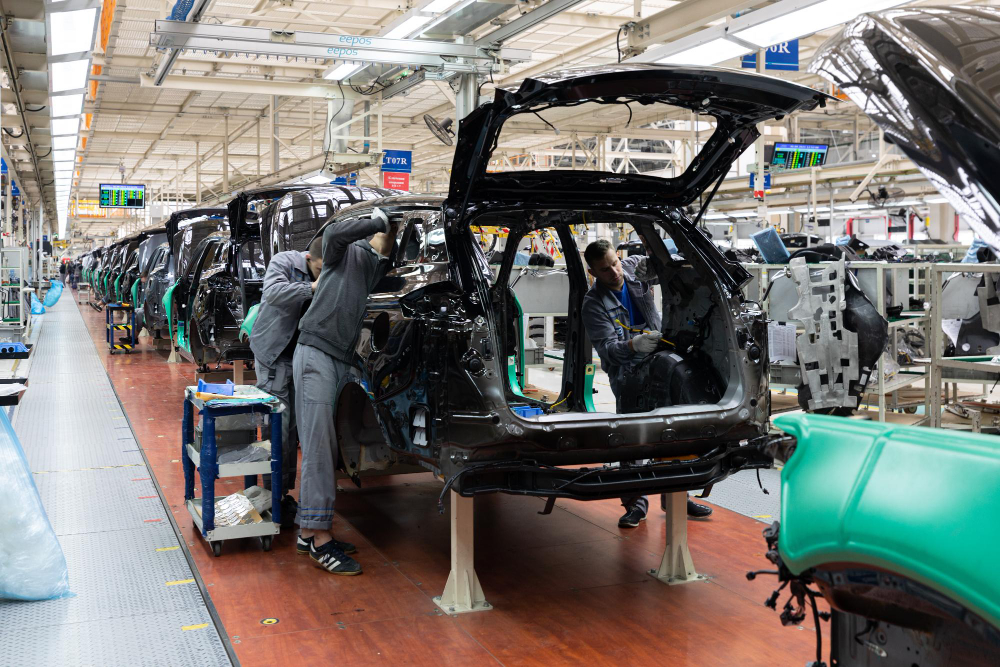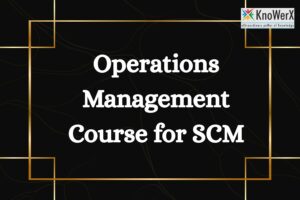The Shocking Reality of Automobile Supply Chains

The Supply Chain in the Automobile Industry involves managing the flow of raw materials, parts, and finished vehicles from suppliers to customers. It plays a vital role in ensuring efficient production, cost control, and timely delivery. With increasing globalization and technology advancements, automakers rely on strong supply chain strategies to stay competitive and meet market demands.
Definition of Supply Chain Management (SCM)
Supply Chain Management (SCM) is the process of managing the flow of goods, services, and information from suppliers to customers efficiently. It involves coordinating various activities such as procurement, production, logistics, and distribution to ensure a seamless operation.
Importance of SCM in the Automobile Industry
SCM plays a crucial role in the automobile industry by ensuring smooth production, reducing costs, and delivering high-quality vehicles on time. Effective supply chain management helps manufacturers maintain efficiency, reduce lead times, and improve customer satisfaction while adapting to market demands.
Overview of the Automobile Supply Chain
The automobile supply chain includes multiple key players, such as raw material suppliers, component manufacturers, automobile manufacturers (OEMs), logistics providers, and dealerships. Each stage of the supply chain contributes to the final product, ensuring that vehicles are produced, assembled, transported, and sold efficiently.
Key Components of the Automobile Supply Chain
Raw Material Suppliers
- The automobile industry relies on various raw materials, including steel, aluminum, plastics, rubber, and glass, which are essential for manufacturing vehicle components.
- Key suppliers provide these raw materials in bulk to ensure consistent production, and they must meet strict quality and compliance standards.
- Efficient raw material sourcing helps reduce production costs and ensures timely availability, preventing bottlenecks in the supply chain.
Component Manufacturers
- Component manufacturers produce essential vehicle parts such as engines, transmissions, electronic systems, and braking systems.
- The supply chain is structured into Tier 1, Tier 2, and Tier 3 suppliers, each responsible for different levels of component production.
- Effective coordination between manufacturers and suppliers ensures the availability of high-quality parts while maintaining cost efficiency.
Automobile Manufacturers (OEMs)
- Original Equipment Manufacturers (OEMs) are responsible for assembling different components to manufacture complete vehicles.
- The assembly process involves multiple stages, including welding, painting, engine installation, and final quality checks before shipment.
- OEMs play a critical role in ensuring that production aligns with market demand and regulatory standards.
Distribution and Logistics
- Once vehicles are manufactured, they must be transported from factories to dealerships or export locations.
- Efficient warehousing and inventory management help streamline the distribution process and reduce storage costs.
- The use of advanced logistics solutions, such as real-time tracking and optimized routing, ensures timely deliveries and minimizes transportation expenses.
Dealerships and Retailers
- Dealerships act as the final point of sale, connecting manufacturers with consumers.
- They provide sales services, financing options, and after-sales support, such as vehicle maintenance and warranty services.
- Strong customer relationship management strategies help dealerships build brand loyalty and enhance customer satisfaction.
Supply Chain Processes in the Automobile Industry
Procurement
- Procurement involves sourcing raw materials and components from reliable suppliers while ensuring cost efficiency and quality.
- Effective supplier relationship management helps manufacturers negotiate better contracts and minimize supply chain risks.
- Companies use strategic sourcing techniques to select suppliers that meet their production requirements and sustainability goals.
Production Planning and Scheduling
- Just-In-Time (JIT) and Lean Manufacturing techniques are used to minimize waste and improve efficiency.
- Production forecasting and capacity planning help manufacturers meet demand fluctuations without overproducing or underproducing.
- Proper scheduling ensures that manufacturing lines operate at optimal levels, reducing downtime and maximizing productivity.
Inventory Management
- Stock control techniques help prevent shortages and excess inventory, reducing holding costs and waste.
- Inventory turnover optimization ensures that components and raw materials are used efficiently to meet production timelines.
- Modern inventory management systems use AI-driven analytics to predict demand and maintain optimal stock levels.
Logistics and Transportation
- Managing inbound logistics ensures that raw materials and components reach factories on time for production.
- Outbound logistics involves transporting finished vehicles to dealers and consumers while maintaining efficiency.
- The use of GPS tracking, RFID technology, and automated logistics solutions enhances real-time monitoring and delivery accuracy.
Quality Control and Assurance
- Automobile manufacturers must adhere to industry standards and certifications, such as ISO/TS 16949, to ensure quality.
- Rigorous quality checks at various production stages help identify defects and maintain consistency.
- Implementing quality assurance measures reduces the risk of recalls and enhances customer trust in the brand.
Challenges in the Automobile Supply Chain
Globalization and Geopolitical Issues
- The global nature of automobile supply chains makes them vulnerable to trade tariffs, import/export restrictions, and geopolitical instability.
- Political tensions, trade wars, and economic policies can disrupt the supply of essential raw materials and components.
- Companies must develop contingency plans and diversify their supplier base to mitigate these risks.
Demand Fluctuations
- Seasonal variations in vehicle demand affect production schedules and inventory management.
- Economic downturns, fuel price fluctuations, and changing consumer preferences impact sales and supply chain stability.
- Automakers use flexible production models and demand forecasting tools to adjust to market shifts effectively.
Technological Changes
- The transition to electric vehicles (EVs) requires significant changes in the supply chain, including sourcing new materials such as lithium for batteries.
- The integration of IoT, AI, and automation is reshaping manufacturing and logistics processes.
- Automakers must invest in new technologies and retrain the workforce to keep up with advancements in the industry.
Environmental and Regulatory Compliance
- Stringent emission regulations require automakers to adopt eco-friendly production methods and reduce carbon footprints.
- Compliance with sustainability initiatives involves recycling programs, waste reduction, and adopting green energy solutions.
- Companies must monitor and adapt to evolving environmental laws to avoid penalties and maintain a positive brand reputation.
Technological Innovations in Automobile Supply Chain
Digitalization and Industry 4.0
- The adoption of Big Data analytics helps manufacturers make data-driven decisions for optimizing supply chain performance.
- Blockchain technology enhances transparency and security by creating tamper-proof records of transactions and supply chain activities.
- Digital twins and smart factories are improving efficiency and reducing operational costs in automobile production.
Automation and Robotics
- Automated Guided Vehicles (AGVs) streamline warehouse operations and reduce human intervention.
- Robotics is widely used in assembly lines to improve precision, efficiency, and safety.
- Automation reduces labor costs, minimizes errors, and increases overall productivity in automobile manufacturing.
Artificial Intelligence and Machine Learning
- AI-driven predictive maintenance helps manufacturers identify potential failures before they occur, reducing downtime.
- Demand forecasting models use AI and machine learning algorithms to optimize inventory and production schedules.
- AI-powered chatbots and virtual assistants enhance customer support and streamline service requests in the automobile sector.
Electric and Autonomous Vehicles
- The shift to electric vehicles (EVs) has transformed supply chains, requiring new infrastructure for battery production and recycling.
- Autonomous vehicles are changing logistics operations, with self-driving trucks and delivery vehicles improving transportation efficiency.
- Companies must reconfigure their supply chain strategies to accommodate the unique requirements of EVs and autonomous technology.
Ending Notes

The Supply Chain in the Automobile Industry is a complex yet essential system that ensures the smooth flow of materials, components, and finished vehicles. Effective supply chain management enhances efficiency, reduces costs, and meets customer demands. With advancements in technology and evolving market trends, professionals need to stay updated on the latest SCM strategies.
KnoWerX, a leading institute in Supply Chain Management, provides expert training and certifications to help professionals master the complexities of modern supply chains. By gaining in-depth knowledge and practical skills, individuals can contribute to a more efficient and resilient automobile supply chain.
Image Reference: Freepik
Disclaimer: All trademarks, logos, and brand names are the property of their respective owners. All company, product, and service names used in this website are for identification purposes only. Use of these names, trademarks, and brands does not imply endorsement.



